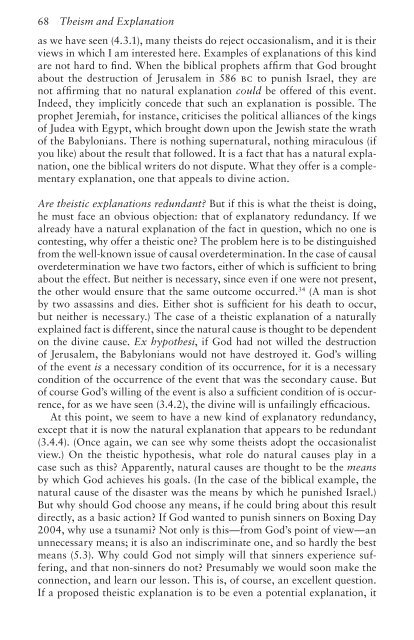Theism and Explanation - Appeared-to-Blogly
Theism and Explanation - Appeared-to-Blogly
Theism and Explanation - Appeared-to-Blogly
Create successful ePaper yourself
Turn your PDF publications into a flip-book with our unique Google optimized e-Paper software.
68 <strong>Theism</strong> <strong>and</strong> <strong>Explanation</strong><br />
as we have seen (4.3.1), many theists do reject occasionalism, <strong>and</strong> it is their<br />
views in which I am interested here. Examples of explanations of this kind<br />
are not hard <strong>to</strong> fi nd. When the biblical prophets affi rm that God brought<br />
about the destruction of Jerusalem in 586 bc <strong>to</strong> punish Israel, they are<br />
not affi rming that no natural explanation could be offered of this event.<br />
Indeed, they implicitly concede that such an explanation is possible. The<br />
prophet Jeremiah, for instance, criticises the political alliances of the kings<br />
of Judea with Egypt, which brought down upon the Jewish state the wrath<br />
of the Babylonians. There is nothing supernatural, nothing miraculous (if<br />
you like) about the result that followed. It is a fact that has a natural explanation,<br />
one the biblical writers do not dispute. What they offer is a complementary<br />
explanation, one that appeals <strong>to</strong> divine action.<br />
Are theistic explanations redundant? But if this is what the theist is doing,<br />
he must face an obvious objection: that of explana<strong>to</strong>ry redundancy. If we<br />
already have a natural explanation of the fact in question, which no one is<br />
contesting, why offer a theistic one? The problem here is <strong>to</strong> be distinguished<br />
from the well-known issue of causal overdetermination. In the case of causal<br />
overdetermination we have two fac<strong>to</strong>rs, either of which is suffi cient <strong>to</strong> bring<br />
about the effect. But neither is necessary, since even if one were not present,<br />
the other would ensure that the same outcome occurred. 34 (A man is shot<br />
by two assassins <strong>and</strong> dies. Either shot is suffi cient for his death <strong>to</strong> occur,<br />
but neither is necessary.) The case of a theistic explanation of a naturally<br />
explained fact is different, since the natural cause is thought <strong>to</strong> be dependent<br />
on the divine cause. Ex hypothesi, if God had not willed the destruction<br />
of Jerusalem, the Babylonians would not have destroyed it. God’s willing<br />
of the event is a necessary condition of its occurrence, for it is a necessary<br />
condition of the occurrence of the event that was the secondary cause. But<br />
of course God’s willing of the event is also a suffi cient condition of is occurrence,<br />
for as we have seen (3.4.2), the divine will is unfailingly effi cacious.<br />
At this point, we seem <strong>to</strong> have a new kind of explana<strong>to</strong>ry redundancy,<br />
except that it is now the natural explanation that appears <strong>to</strong> be redundant<br />
(3.4.4). (Once again, we can see why some theists adopt the occasionalist<br />
view.) On the theistic hypothesis, what role do natural causes play in a<br />
case such as this? Apparently, natural causes are thought <strong>to</strong> be the means<br />
by which God achieves his goals. (In the case of the biblical example, the<br />
natural cause of the disaster was the means by which he punished Israel.)<br />
But why should God choose any means, if he could bring about this result<br />
directly, as a basic action? If God wanted <strong>to</strong> punish sinners on Boxing Day<br />
2004, why use a tsunami? Not only is this—from God’s point of view—an<br />
unnecessary means; it is also an indiscriminate one, <strong>and</strong> so hardly the best<br />
means (5.3). Why could God not simply will that sinners experience suffering,<br />
<strong>and</strong> that non-sinners do not? Presumably we would soon make the<br />
connection, <strong>and</strong> learn our lesson. This is, of course, an excellent question.<br />
If a proposed theistic explanation is <strong>to</strong> be even a potential explanation, it



